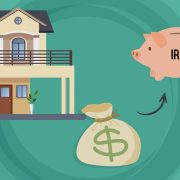Real Estate IRA: What Every Retirement Investor Needs to Know
You’re an investor who’s focused on the long-term: your ability to retire with a nest egg. You want to build over the long-term, and you know that there are many different vehicles for doing just that, including employer-based 401(k) plans and more. But what many investors overlook is the possibility of using a Real Estate IRA in their retirement portfolio.
Why do they overlook it? For one, the option is rarely presented to them. Many people don’t even know that you can invest in real estate with an IRA. Another reason: many people believe that investing in real estate is a “rich man’s” game. But investing in real estate is available to anyone with the drive and interest to make it happen. Let’s take a look at what every retirement investor needs to know about the Real Estate IRA in order to make it part of their portfolio.
How to Use a Real Estate IRA to Generate More Wealth
There are two major attractions to real estate if you ask most people: first, real estate represents a tangible asset that isn’t going away. While some people don’t trust in stocks and funds that they can’t see, you can see your real estate. Like owning gold or silver in your IRA, you can touch real estate and you know that there’s intangible value there. That helps many people stay reassured that their investment will be there tomorrow.
Second, real estate allows people to generate a lot of wealth quickly. By using a non-recourse loan, many ordinary investors can use leverage to purchase real estate and add it to their portfolio. This allows you to gain an asset that you wouldn’t normally have access to, and represents a major leap forward for anyone’s retirement portfolio.
Caveats and Regulations in Real Estate IRAs
Of course, simply buying a lot of real estate and holding it in your IRA isn’t possible—you also need to know the rules that govern these transactions in order to ensure that your investments will be valid and legal. Here are a few things to be aware of:
- Your loan potential will be limited. Non-recourse loans are very valuable in that they mean that a lender can’t come after the rest of your money should you default on this kind of loan…but it also means that non-recourse loans come with other disadvantages.
- You cannot live in your real estate investment. If you purchase a duplex in normal conditions and rent out one half, you can live in the other half. That’s perfectly acceptable. But if you hold a duplex in your Real Estate IRA, you won’t be allowed to live in it. That’s part of keeping the retirement fund separate from your net assets, which is one of the advantages—however, in some cases, such as this one, it also means rules you’ll have to adhere to.
It’s important to review many of these rules and regulations. You do have a tremendous amount of freedom with a Real Estate IRA, but check out our page on real estate to learn more about how a Real Estate IRA will actually look for you in your retirement portfolio.
Taking the Next Step
Are you interested in a Real Estate IRA? Are you at least interested in learning more information about how these can be utilized to build a strong, tangible portfolio of real assets for your retirement? Then check out the pages you see here at AmericanIRA.com and don’t be afraid to contact us at 828-257-4949 to learn more all about Self-Directed IRAs.



